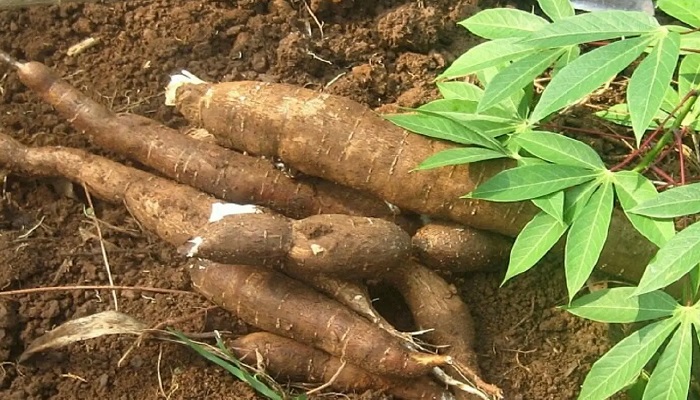Cassava is a very common food consumed and grown in various parts of Africa; this makes cassava farming in Nigeria a good business idea.
Generally, it does very well in different types of soil and ecology. Cassava can be grown alone or together with other types of crops such as groundnuts, maize, vegetables, or rice.
Growing the Crop is not labor-intensive. Usually, 75 to 125 persons can comfortably work on an acre of land. This will include preparing the land to harvest. You can harvest the storage roots between 9 to 18 months after you have planted.
Under the practice of traditional farming, you can expect 8 to 15 tones in a hectare of land with cassava only.
During the harsh climatic conditions, cassava will still be productive as other plants fail. You will find a good market for your cassava in many places. The market is readily available.
Cassava can be well processed into many different food products, also a starch for local consumption, or the international markets.
Nevertheless, you can make a good vegetable meal using the leaves of cassava. They are known to be very nutritious.
If you have animals, you can still feed them using the root and the leaves. The stem of the plant can also be used as good planting material.
To be successful in cassava planting in Nigeria, you will have to practice plant protection and production. The practices have to be done simultaneously. This is soil improvement, site selection, plant selection, planting measures, weed control, and pests.
You will be required to research a lot on the types of diseases and weeds that mostly affect the cassava. When necessary, you can visit your local agricultural expert for consultation.
Establishing A Cassava Farm In Nigeria
Site location is a very important aspect of basic requirement before any plantation. Cassava is known to do well in loamy soil that is quite deep. Choose a site that has adequate rainfall, warm, and wet climatic conditions.
Many factors can help you identify a suitable place to grow the cassava. These factors include;
- Soil texture
- Fertility
- The topography of the land
- Vegetation
- History of the site
1. Soil Texture
The most suitable soil for growing the cassava plant should be loamy soil can that is deep. The soil will be rich in nutrients and easy to work on because it can hold water for a long period.
However, the best way you can test if the soil is loamy is by dropping some water then try to make a ball out of the soil. If you happen to squeeze the ball and it spreads or falls apart, your soil could be loamy.
If you try to make a ball and the soil is gritty and does not make a ball, then that soil could be sandy. If you try to make a ball and the soil makes a good one, and then does not fall apart, then the soil has a lot of clay in it.
Sandy and clay soils are poor when it comes to cassava planting. Try as much as possible to avoid soil that is not loamy.
2. Soil Fertility
Before you plant your cassava in Nigeria, it is very important to identify the place where there is fertile soil. Quite often, the loamy soil will be dark in colour. It can be dark brown or dark red. Dark soil exposes that it has plenty of organic matter.
When you find soil that is grey and has some blue or green spots, that will be an indication that the soil is poor in waterlogging and drainage, you should never grow your cassava in soil that can easily be waterlogged.
3. Topography of Land
In cassava planting, it is very important to consider the land. Make sure that the land is gentle and sloppy. However, many cassava farms in Nigeria are flat. When you plant on a steep slope area, your soil might be carried away by the rains through soil erosion.
Therefore, avoid the steep slope land as much as you can. Having your cassava farm in a valley is not always a good idea because they normally have water logging, which makes the cassava root not grow well.
4. Vegetation
Identify the areas that have a lot of vegetation cover. The areas are believed to be having very fertile loamy soil. This is because the presence of the vegetation normally covers the soil from receiving direct sunlight.
They also reduce the rate at which the evaporation takes the place of the moisture in the soil. Further, the vegetation drops the leaves to the plant, whereby they rot and eventually add nutrients to the soil.
5. History of the Site
In Nigeria, you will come across many farms. Some have been exhausted through the use of modern chemicals to control pests and diseases. Therefore, it is very important to know the history of your land.
You should be able to know the pests and the weeds that attack the area. That information will help you in avoiding the land that has a bad history.
Cassava Planting Season In Nigeria
- Cassava planting begins in April – however, it can extend to October.
- 60 bundles of the cassava stem are recommended for 1 ha.
- Cassava cutting of the stem should be 25cm long and planted in a spacing of 1m × 1m.
- Practice and maintain 100% of cassava plantations and always replace the dead stems with new ones.
- Make sure to apply fertilizer eight weeks after you have planted. You can apply it using the ring method. You will have to make sure there is no contact between the fertilizer and the stem of the leaves.
How Much to Start Cassava Farming?
With around 200,000 Naira, you will be comfortable starting cassava planting in Nigeria. However, to reduce the production cost and get high yields, it is very important to have full land preparation.
Cassava has high returns when the proper mechanism of framing is applied. Therefore, you should be very careful during each process right from identifying the appropriate site or the land. Cassava can give you good returns in Nigeria since the market is available.
I, therefore, conclude by saying that Cassava farming is a very lucrative business. It is also less stressful when compared with other businesses. Finally, it is very easy to manage.


